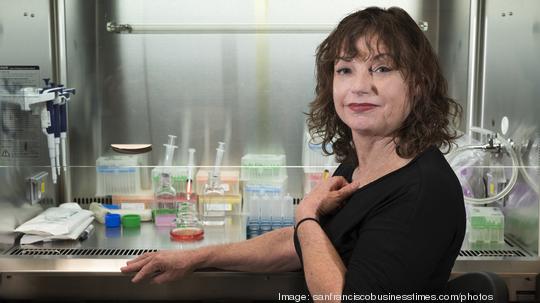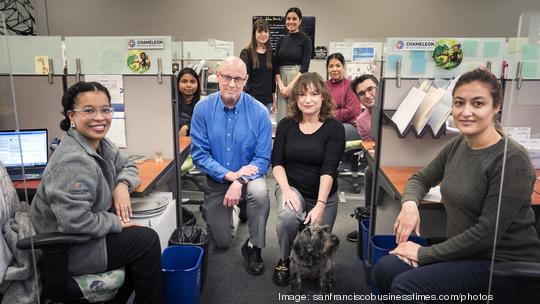
Rare genetic diseases remain stubbornly difficult to treat despite decades of advancements in genetics and immunology, but Chameleon Biosciences is blending technology from both areas to aim for better patient outcomes, particularly among children.
For some rare diseases, gene therapy can provide relief but there are limitations, including the amount of doses a patient can receive — typically only one.
That's because the therapy is delivered via adeno-associated viruses, or AAVs, which are empty shells of a virus that can be loaded with different genetic material. It can be an effective way to deliver vital treatments, but can also trigger an immune response which might lower the efficacy or even make a patient sick.
Scientists believe that AAVs don't cause disease symptoms themselves but they are found alongside adenoviruses that cause diseases like the common cold, and if a patient was unknowingly exposed to an AAV during a previous infection, even one dose of this type of gene therapy can be intolerable because their immune system will attack it.
Preventing an immune response could potentially solve those problems, and that's what Chameleon is trying to do.
The Berkeley startup was co-founded in 2017 by CEO Genine Winslow and Casey Maguire, who is an associate professor of neurology at Harvard, and it was the runner-up in Bay Area Inno's inaugural Inno Madness bracket-style competition which featured thirty-two Bay Area startups.
Winslow, 61, has been working in the genetics field for around three decades. She studied molecular biology at the University of California at both Davis and Berkeley, and was working on a Ph.D. program at the latter but left it to raise a family.
When she worked on cloning genes at Genentech in the 1980s, sequencing proteins was a manual process that took about two weeks. It involved growing bacteria, making reagents in the lab and using radioactive labels to identity matching DNA. The industry has much safer and more automated protocols now.
After Genentech, Winslow went on to work at several other biotech companies, including BioMarin Pharmaceutical and Audentes Therapeutics, where she was focused on developing gene therapies.
While at Audentes, she was working with patients that had a rare, often fatal genetic disease — known as x-linked myotubular myopathy — which causes muscle weakness in infants and she noticed that there was a disconnect between the immunologists and geneticists who were also caring for these patients.
"I interacted with the father of a child who had one of these diseases and I just couldn't imagine having a child who had a life-threatening genetic disease," Winslow said. And the "current technology didn't turn out to be life-saving for them. It's phenomenal early clinical trial results but not all of the children could be treated. Some of them were excluded from clinical trials and it has to do with the biology of the virus that we use to shuttle therapeutic genes into cells."

So the team at Chameleon is essentially developing an invisibility cloak, Winslow told me, so that gene therapies can be administered via AAVs without triggering an immune response. It's a technique inspired by the way cancerous tumors naturally evade the immune system.
"What we did is looked at how tumors do that and we used some of the same tricks to fool our patients' immune response," Winslow said. "We took what's known from oncology and transferred that know-how to a gene therapy setting. Our particle is very unique but, actually, the technique we use to make it has been around for 30 years."
Not only does this have the potential to allow for multiple doses, including in patients who have developed natural immunity to AAVs, Winslow said, but a single dose could become more effective.
The company is currently focused on four diseases: hemophilia A, severe hemophilia B, Niemann-Pick Type C (commonly referred to as "childhood Alzheimer's") and mitochondrial neurogastrointestinal encephalomyopathy.
Their first clinical trial will be focused on hemophilia B patients which Winslow hopes will start by mid-2025.
Chameleon went through Berkeley's SkyDeck accelerator and has raised $17 million in seed funding from investors including the SkyDeck Fund, Cantos Ventures, Life Science Angels, Matrix Partners China, CureDuchenne and several individuals. It will be raising a Series A round soon to help fund its efforts towards a clinical trial.
Winslow has experienced lots of change in the biotech industry over the past three-plus decades. Not only in terms of what the industry is able to achieve, but also who is able to contribute.
She left the workforce for 11 years to raise two children, a major life event that sets many women back in their careers. Female founders also still raise a fraction of the billions of dollars available in the venture capital industry.
"You're always gonna encounter hurdles and you just can't give up," Winslow said.
She has also told her daughters about the challenges women used to face in the biotech and science fields.
"My youngest is in a Ph.D. program studying biochemistry and she couldn't believe it. So that's really reassuring because that means, for her, she's not seeing it," Winslow said. "So that's a lot of progress, and we have to keep doing that and we have to not give up."



